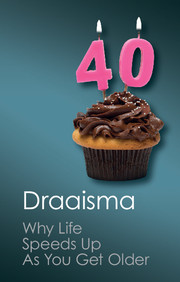Book contents
- Frontmatter
- Contents
- List of illustrations
- Acknowledgments
- 1 ‘Memory is like a dog that lies down where it pleases’
- 2 Flashes in the dark: first memories
- 3 Smell and memory
- 4 Yesterday's record
- 5 The inner flashbulb
- 6 ‘Why do we remember forwards and not backwards?’
- 7 The absolute memories of Funes and Sherashevsky
- 8 The advantages of a defect: the savant syndrome
- 9 The memory of a grandmaster: a conversation with Ton Sijbrands
- 10 Trauma and memory: the Demjanjuk case
- 11 Richard and Anna Wagner: forty-five years of married life
- 12 ‘In oval mirrors we drive around’: on experiencing a sense of déjà vu
- 13 Reminiscences
- 14 Why life speeds up as you get older
- 15 Forgetting
- 16 ‘I saw my life flash before me’
- 17 From memory – Portrait with Still Life
- Bibliography
- Index of names
6 - ‘Why do we remember forwards and not backwards?’
Published online by Cambridge University Press: 05 July 2014
- Frontmatter
- Contents
- List of illustrations
- Acknowledgments
- 1 ‘Memory is like a dog that lies down where it pleases’
- 2 Flashes in the dark: first memories
- 3 Smell and memory
- 4 Yesterday's record
- 5 The inner flashbulb
- 6 ‘Why do we remember forwards and not backwards?’
- 7 The absolute memories of Funes and Sherashevsky
- 8 The advantages of a defect: the savant syndrome
- 9 The memory of a grandmaster: a conversation with Ton Sijbrands
- 10 Trauma and memory: the Demjanjuk case
- 11 Richard and Anna Wagner: forty-five years of married life
- 12 ‘In oval mirrors we drive around’: on experiencing a sense of déjà vu
- 13 Reminiscences
- 14 Why life speeds up as you get older
- 15 Forgetting
- 16 ‘I saw my life flash before me’
- 17 From memory – Portrait with Still Life
- Bibliography
- Index of names
Summary
One of the pleasures of non-computerized literary searches is the chance discovery. You page through an entire year of a periodical, allow your fingers to run through the table of contents, look up various entries in it or in the index, and in the unpredictability of this archaic search process, you come up with an unexpected find, sometimes more valuable than what you were searching for. A short while ago I was riffling through the pages of the 1887 volume of Mind, looking for a particular review, when I saw the title of an article flash by: ‘Why do we remember forwards and not backwards?’ This question produced a kind of intellectual double take: I had already left the library with a copy of the review I had originally come for when the subtlety of the question suddenly struck me and I retraced my steps to read the whole article.
It ran to less than four pages and had been written by Francis Herbert Bradley (1846–1924), an Oxford philosopher of the idealist school. Bradley needed no more than a few paragraphs to demonstrate that you cannot always give a simple answer to a simple question.
The simple answer concerning the direction of our remembering is that your memory replicates the course of events: first there was X, then there was Y, and you might expect to remember them in that order.
- Type
- Chapter
- Information
- Why Life Speeds Up As You Get OlderHow Memory Shapes our Past, pp. 55 - 60Publisher: Cambridge University PressPrint publication year: 2012



